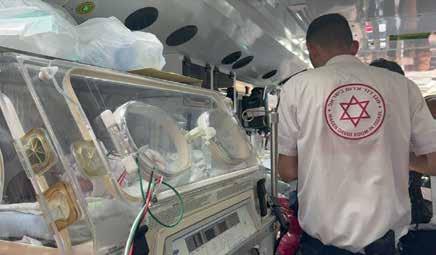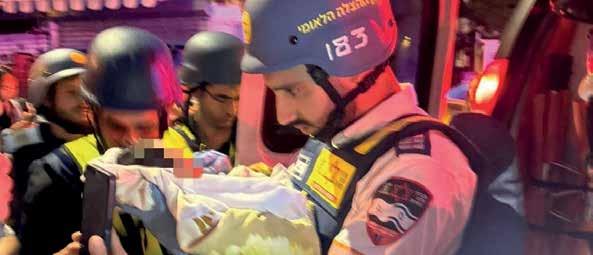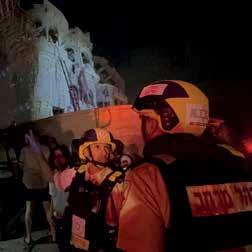






























YOSSI SAUNDERS
As we sit here in the safe room, we go through our usual checklist: all the kids are here, check; water bottles and food, check; Tehillim and books, check; phone chargers and iPads, check; board and card games; check; spare clothing and chamber pot; check.
We’ve always believed that as long as we are inside this safe space, we would be safe. But now, hearing that several people were killed overnight while in their safe room due to a direct hit, something has shifted inside us. It heightens our panic, even if only in our minds.
Why is it so hard to fall asleep? Why does our heart pound so loudly in our chests? Perhaps it’s because twenty-four people have been killed in the past few nights, and suddenly, we feel vulnerable—sitting ducks if the threat reaches us. Without faith in Hashem above, this fear would be overwhelming.
The thought of being struck by a missile, thought once to be unimaginable, has now become very real and close.

Sirens wail louder, phones screech with urgent alerts, and the screen lights up with the yellow warning cone message: “You are in imminent danger—go immediately to a safe room. Do not come out until told it is safe.”
More inbound missiles from Iran are detected. Our neighbour sent us a video of the missiles flying over Bet Shemesh towards Haifa, on their way to cause more devastation.


This is reality. This is war. War is frightening — even for adults. We try to put on brave faces for our children, telling them to relax and go to sleep. But do they see through us? How can we truly relax when our entire family is huddled on mattresses on the floor, hearing loud booms overhead as missiles are intercepted? Continued on Page 4







BY DAVID SAFFER
As Israel’s Operation Rising Lion enters a seventh day of action to end Iran’s nuclear threat, US President Donald Trump has called for total victory after his demand for an “unconditional surrender” was rejected by Iran.
Over 200 aircraft have pummelled targets in the largest sustained attack on Iran since the Iran-Iraq war. A wave of attacks has included Iran’s military leadership, ballistic missile production, storage and air defences.
The IDF announced yesterday it successfully struck a centrifuge factory for Iran’s nuclear programme. Other targets included factories for surface-to-surface and surface-to-air missiles.
Defense Minister Yisrael Katz warned Iran of further precision attacks.
“A tornado is sweeping through Tehran. Symbols of government are bombed and collapsing, from the broadcasting authority and soon more targets, and masses of residents are fleeing,” he wrote on X. “This is how dictatorships collapse.”
With reports that Iran could strike US Middle East bases, Trump has increased his rhetoric, claiming on Truth Social to have “complete and total control of the skies over Iran”.
Trump warned Iranian Supreme Leader Ayatollah Ali Khamenei that he was safe “for now”.
He posted. “We are not going to take him out (kill!), at least not for now… our patience is wearing thin … UNCONDITIONAL SURRENDER!”
Trump was briefly at the G7 summit in Kananaskis in Canada where world leaders called for a “de-escalation of hostilities in the Middle East, including a ceasefire in Gaza” but did not call for a ceasefire in the Iran-Israel conflict
Khamenei stated yesterday there would be “irreparable harm” if the US joins Israel in targeting underground nuclear sites, especially the Fordow uranium enrichment site deep underground.
Only the US has the capability of destroying the facility with its 30,000lb
Editorial Continued
My wife tells me to move the younger children away from the glass window, just in case it shatters. So the mattress beneath the window becomes my spot. When the older kids ask why, she gently changes the subject. She doesn’t want them to know that even in the saferoom, we’re not entirely safe.
We utter Tehillim, though it really is evident that we are chanting it in

‘bunker buster’ carried by an American B-2. Israel does not have this bomb or plane. Meantime, 30 US military tanker planes, used to refuel fighter and bombers mid-air have moved from US bases to Europe.
Throughout recent days Israeli leaders have given a stark warning at the stakes the IDF is fighting.
Netanyahu said Israel was at a “decisive point” in history when announcing the launch of the campaign that struck sites in Tehran, Natanz and Fordow.
“This operation will continue until the mission is completed,” he vowed. “Iran has built a massive store of ballistic missiles. Each one carries a ton of explosives and can reach Israel from Iran within minutes. They planned to produce 20,000 of them in the next six years. We cannot leave these threats for the next generation because if we don’t act now, there will not be another generation. ‘Never Again’ is now.”
Netanyahu thanked Trump for his support throughout the years of his presidency.
Addressing the Iranian people, he noted: “We have a common enemy, a tyrannical regime that tramples you. I have no doubt your day of liberation is closer than ever. When that day comes, Israelis and Iranians will once again be partners in building a future of peace and prosperity.”
He concluded: “We are defending the free world from the terrorism and barbarism that Iran fosters and exports across the globe. Hard days lie ahead but also great days. What we do today will be etched into the annals of Israel and of all nations as a struggle for the triumph of good over evil.”
Iranian strikes at night have killed 24 Israelis to date.
At the Weizmann Institute of Science in Rehovot, President Isaac Herzog said: “Iran will try havoc, death and destruction. We will continue promoting life, liberties, civil liberties, and, of course, democracy and the plight for peace as we believe in.”
In Petah Tikva, he told reporters: “I have
desperate times rather than peaceful times. Still, we are grateful for our safe room and for those who don’t have such protection—those who must share with others or remain vulnerable. We are of course ever grateful to the brave soldiers of the IDF who put their lives on the line to keep us safe.
In the morning, we wake up to the Modeh Ani, which today feels richer, more meaningful than ever before.
Despite the chaos—no school, the stress of keeping children entertained—our kids play outside with the neighbours: sports tournaments, colour wars, water fights, laughter ringing more vibrantly than ever. My children are safe outside, and their freedom, in this land we love, feels nothing short of miraculous.
And yet, just as we settle into hope,
news for the Iranian regime. We’re a resilient nation. The Iranian people are fed up and want change and so do the entire region, we deserve change.”
In the northern town of Tamra where four Arab women were killed, Herzog noted: “Iran and its terror proxies do not distinguish between Jews and Arabs. Here, they murdered Muslim women. To them, we are all enemies. This is a war of the free world against terror.”
Ambassador to the UN Danny Danon speaking at a security council meeting addressed a secret plot by Iran to attack Israel with proxies. He also criticised UN Secretary-General António Guterres who expressed “concern” over Israel’s operation last Friday.
“Where was the secretary-general when Iran spent years arming itself while vowing to wipe Israel off the map?” he raged. “Where was his voice when Iran rained hundreds of missiles and drones on our civilians? We will not sit quietly while our people are targeted. Empty words will not stop Iran. Israel will.”
Regarding Israel’s pre-emptive strikes, Danon said. “The mission was very clear, dismantle Iran’s nuclear program, eliminate the architects of its terror and aggression and neutralise the regime’s ability to follow through on its repeated public promise to destroy the state of Israel… How long did the world expect us to wait? How long?... Until they assembled the bomb? Until they mounted it on a Shahab missile? Until it was en route to Tel Aviv or Jerusalem.”
Danon slammed the international community. “When Iran marched toward nuclear capability, you said nothing,” he seethed. “When they crossed line after line, you drew none of your own. We acted to ensure our people live. We acted so that Jewish children in Jerusalem will not wake up to the sound of air raid sirens triggered by a nuclear launch.”
Danon called for “recognition” of Israel’s action against Iran as its regime had “violated every obligation they ever undertook” and Israel’s “undeniable right and duty” to defend its people from extermination.
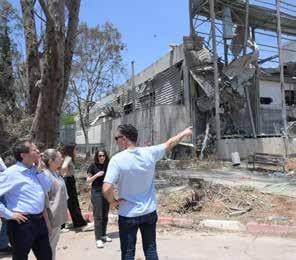
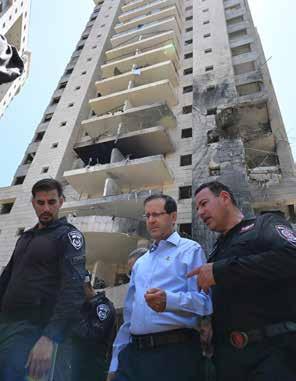
another siren wails. But Jews have endured these threats for thousands of years. It’s part of our national identity— the underdog. Iran, with 72 times the size and 70 million more people than Israel—70 million more—yet here we stand, witnessing history unfold exactly as the prophets foretold thousands of years ago.
I am proud of my nation, rising boldly like Judah’s lion, striving to rid the world of the terrible threat of Iranian nuclear ambitions. Despite the dangers, there’s nowhere else we’d rather be. As we turn off the lights and close our eyes, hoping this isn’t the final night, we still dream that this might be the moment to see the final prophecies fulfilled—speedily, in our days. Amen



w e ’ v e g o t i t c o v e r e d
L o n d o n - w i d e p r o p e r t y m a n a g e m e n t b y e x p e r i e n c e d
p r o f e s s i o n a l s w h o t r e a t y o u r i n v e s t m e n t l i k e t h e i r o w n .
T r u s t e d b y l a n d l o r d s a c r o s s t h e c a p i t a l , g e t i n t o u c h
t o d a y a n d s e e h o w w e c a n m a k e y o u r l i f e e a s i e r .








BY ADAM MOSES
The Conference of European Rabbis has called on the European Union and member states to “unequivocally” support Israel’s military action against the Islamic Republic of Iran.
CER president Chief Rabbi Pinchas Goldschmidt welcomed European Commission President Ursula von der Leyen offering “unwavering support” to the State of Israel. “Her steadfast leadership demonstrates a clear understanding of what is at stake, not only for Israel, but for the security and moral integrity of Europe,” he said. Goldschmidt said “history will judge” the EU. “Iran’s decades-long devotion to the destruction of Israel and, by extension, the West, and pursuing nuclear weapons directly for this aim, loomed over all of us as citizens of Europe,” he noted. “Iran has attempted to launch terror attacks on Jewish communities across Europe and seeks to destabilise the continent as a whole. Israel is putting a stop to a great threat to Europe and the West today. History will judge how our continent will respond in this moment.”
CER, meantime, met in Munich for its biannual Executive meeting, after the gathering was shockingly cancelled a few days before the scheduled event at the Hotel Swissôtel in Sarajevo, on Monday, Bosnian Federal Minister of Labour and Social Policy, Adnan Delic, opposed the gathering in an open letter in the Bosnian press citing Israel as a “genocidal entity” for the “systematic destruction of the Palestinian people”.
The hotel axed the meeting alluding to safety concerns and instructions from the authorities.
Fifty Chief Rabbis across Europe including from the United Kingdom, France, Germany and the Netherlands,
however, in person or virtually, discussed various issues facing Jewish communities.
The agenda was led by Dayan Menachem Gelley of the London Beth Din.
Topics included circumcision and Shechita, threats to religious dress, Jewish education, burial, security of Jewish communities in Russia and Ukraine, the well-being of Euro Jewry amidst geopolitical tensions and programming for Young Rabbi groups.
Goldschmidt said: “Our world is facing numerous challenges from existential threats like Iran’s missile barrage towards Israel’s population centres to political obstacles such as the rejection of our rabbinic gathering in Sarajevo. But our mission remains clear, to provide halachic, communal and physical support to Jewish communities across Europe. We will continue our work and remain united and supportive to those communities that need.”
Gady Gronich, Director of the CER, commented: “We had less than two days to reorganise this crucial event. The support from the Bavarian Government in Munich has been invaluable.”
Regarding the cancellation, Goldschmidt, said CER was “abruptly disinvited” and “publicly lynched” by activists and politicians in the media “purely because we were Jews”.
“If Jews are unwelcome in Bosnia & Herzegovina, it should be unwelcome into the EU,” he raged. “We are still waiting for an apology from the country’s leaders.”
Goldschmidt was angry no Bosnian Government official had contacted CER.
“We have been made unwelcome and this last-minute, ministerial boycott of Jewish European citizens, dedicated to promoting Jewish life in Europe and furthering dialogue and democracy across the continent is disgraceful,”
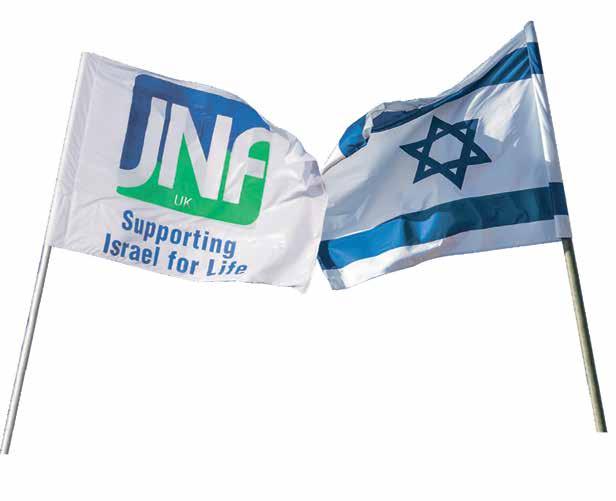
he noted. “CER events foster dialogue, boost interfaith activity and promote public engagement. It is Sarajevo’s loss.”
CER’s chief thanked the Bavarian Government for backing a Munich option.
“We as an organisation will continue unfazed to supporting Jewish communities of Europe,” he said. “This decision to block a European-Jewish conference on European soil is not only alarming, but also revealing. It is a clear violation of EU commitments and values.”
The Jewish community has had a presence in Sarajevo for more than 450 years.
World Jewish Congress expressed its outrage.
“For generations, Sarajevo, once known as the ‘Jerusalem of the Balkans’, was a city of coexistence, where people of different religions could live side-by-side,” WJC noted in a statement. “The decision is a shameful act of antisemitism and affront to the Bosnian capital’s rich history.”
“The failure to ensure security is an ominous sign for the future of Jewish safety,” added Jakob Finci, Bosnia and Herzegovina Jewish community president. “This is a sad slap Sarajevo has given itself.”
Finci was outraged the Gaza war was a cancellation reason with no mention of the October 7 terror attack on Israel.

As Israel faces a new wave of brutal attacks from Iran, with hundreds of missiles targeting civilians, JNF UK stands in unwavering solidarity with the people of Israel.
Our team on the ground is working closely with partner organisations and local authorities to deliver vital support where it’s needed most.
Thanks to your continued support, we are taking action:
Activity packs distributed to children and families evacuated to hotels and in public shelters, bringing comfort and calm amid chaos
11 Disaster Relief Units ready to deploy, containing essential equipment for first aid, rubble clearance, emergency power and communication
Thousands of emergency packs for households containing critical items including a torch, radio, batteries and first-aid supplies

Hundreds of mattresses for shelters, so families can sleep in comfort during the ongoing night-time attacks



BY DAVID SAFFER
Ambassador Tzipi Hotovely defended Israel’s military operation in a hard hitting interview on LBC radio on Tuesday evening.
Hotovely stood firm under pressing questions by presenter Andrew Marr about the Iran and Gaza war.
Asked about Israel’s intention to topple the Iranian regime, she dismissed the question.
“The Prime Minister (Netanyahu) was absolutely clear that we are after the nuclear programme,” Hotovely told Marr. “We are in this military operation to defend the region, defend the world and make sure Iran does not have nuclear capabilities.
“The UK was Israel’s partner for many years in fighting this threat. This is not just a threat on Israel, your head of MI5 and chief of MI6 was clear that Iran is a direct threat to your country, to the British people, to the Jewish community, to our embassy. This is a radical regime, we know what they are up to, they are about to have a nuclear weapon. Israel will not bring on itself a nuclear Holocaust,this is why we went into this operation.”
Hotovely told Marr that Iran were an existential threat with a nuclear and ballistic missile programme.
The Israeli ambassador was as forthright when asked whther the United States would remove Iran’s nuclear capability and assassinate its Iranian Supreme Leader Ayatollah Ali Khamenei.
“The President sees this regime as one that will never have nuclear capability,”
Hotovely said. “He agrees that this regime is dangerous.” She added: “We don’t believe in fake negotiations, the Iranians were misleading the international community, while they were negotiating they were racing to a nuclear bomb… We have a very clear aim in this military attack… once their capabilities are damaged we are in a different place.”
Hotovely said Israel had amazed the world and global leaders with its operation.
“Israel is doing a huge service to this country because the missile programme will aim for London,” she noted under pressure from Marr.
Whilst Defence Secretary John Healey has sent jets to the region to support allies, Holtovely said Britain had been “great partners” of the defence coalition but would not be involved in this operation.
“We are very happy that our friends from around the world are supporting this very justified campaign against the most dangerous regime, she said. “We didn’t ask for help (from the UK). We are allies in intelligence cooperation. We do a lot of things together on security, but the UK is not involved.”
Marr asked if the UK was still a reliable ally after it issued sanctions against Israeli ministers?
Hotovely responded: “We have a gap on many issues but on Iran, there was never a gap. The UK government, whether Conservatives or Labour, always thought this regime shouldn’t have nuclear weapons. This is where we agree.”
Asked about the Gaza war, Hotovely told Marr that when Israel wins the Iran war there will be a “huge opportunity” for a
• Tax-efficient investing before and after Aliyah
• Tax-efficient income after 10-year tax-free period
• Receive your entire pension pot tax-free
• Specialist portfolio management for Olim
• No Inheritance Tax (for non-UK-situated assets)
We are seasoned experts in providing long-term financial planning advice for those making Aliyah. Scan the QR code to read more
With investing, your capital is at risk. Tax treatments are subject to individual circumstances and are subject to change.
“proper ceasefire”.
Hotovely continually denied Israel kills or targets civilians.
She angrily told Marr: “Hamas are firing on people and preventing them from getting food because they are losing control of the aid system… we check every facility… the hospitals are not hospitals, they are used as military facilities. Al-Shifa Hospital was Hamas’ headquarters.”
Hotovely added that Hamas leader Yahya Sinwar was found dead sheltering under a building instead of being a brave leader.
She noted: “He was underneath as a terrorist … they (Hamas) don’t care about their own people or the aid. They were looting the aid. Israel does not target civilians.”
Asked whether Israel was attempting to
drive Arabs from Gaza, Hotovely, gave a stern response.
She told Marr: “We are making sure Southern communities will be safe forever and will never be confronted by a barbaric invasion that Hamas committed. It was the worst war crime the Jewish state has ever experienced.”
Hotovely added: “We did not invent 10/7, it happened as a Hamas plan, it was barbaric, to brutally kill innocent people. Every normal country would make sure this will not happen. This is what Israel is doing, we want to make sure Gaza is not a threat, that is why we have operated for so long. We have paid a huge price. Israeli people are extremely resilient and brave because we believe in this cause.”


36 HOUR APPEAL 29–30 JUNE 2025
Demand for Jewish Blind & Disabled’s services continues to grow. More than 135 households are waiting for a safe and accessible place to call home. Help us build more and do more, so we can support everyone in our community living with physical disabilities or vision impairments who needs our services.



By Steve Winston, Managing Director, National Jewish Assembly
As air raid sirens echoed across Tel Aviv and Iranian nuclear facilities erupted in fire and smoke, Israel made one of the most consequential military decisions of our time. It struck at the core of the Islamic Republic’s nuclear programme and the leadership of the IRGC, asserting a right long denied by Western diplomats cowering behind outdated treaties and UN resolutions. And what was the UK’s contribution to this moment of civilisational clarity? A trembling statement from Sir Keir Starmer urging “both sides” to “de-escalate”.
This is not just disappointing. It is cowardice draped in the language of neutrality.
Let us not mince words: Israel’s strike was not an act of belligerence, but an act of necessity. For decades, Iran has built an empire of terror from the embers of the Islamic Revolution. It has trained and armed Hezbollah, Hamas, the Houthis, and countless Shia militias across Iraq and Syria. It has executed dissidents, hanged gay men in public squares, and imprisoned women for daring to show their hair. All while marching steadily toward a nuclear weapon and threatening to use it against the one Jewish state in the world.
Iran’s ambitions were never a secret. The chant “Death to Israel” is not a metaphor in the Islamic Republic - it is policy. And yet, successive British governments, obsessed with legacy diplomacy and naïve engagement, remained willfully blind. The JCPOA
- Barack Obama’s grand diplomatic folly, enthusiastically endorsed by the UK - infused the regime with billions in sanctions relief, funding terror from Gaza to Yemen. In return, Iran gave the world nothing but delay tactics and centrifuges.
And now, faced with the reality of Israeli self-defence, Britain has the audacity to equivocate. Starmer’s lukewarm call for “de-escalation” from both parties betrays either a moral vacuum or a catastrophic misunderstanding of the threat at hand. This is not a schoolyard spat. This is a prelude to a possible regional war - and only one side has openly pledged genocide.
The Israeli government, quite rightly, did not bother to inform the UK of its plans. After years of being patronised, pressured, and even sanctioned by Western allies for defending itself, Israel has little reason to trust the judgment of European governments who cannot keep their own cities safe from radicalisation, let alone understand the existential stakes of the Middle East.
Indeed, that is perhaps the most galling aspect of Britain’s posture. The UK has suffered firsthand from Iranian-linked terror plots. MI5 has confirmed multiple assassination attempts on British soil by Iranian proxies. Iran remains the largest state sponsor of terrorism globally. Yet our government responds to Israel’s disruption of that threat not with gratitude, but with hand-wringing statements crafted to placate an increasingly radicalised domestic audience.

Britain once stood as the cornerstone of Western resolve. Today, it barely manages to avoid being trampled by the tides of ideology and indecision. While Israel endures rocket fire from Iran, Hezbollah, Hamas, and the Houthis, the UK’s jets sit in the region, “preparing for contingencies.” What contingencies? Is the Royal Air Force there to defend British troops and assets only if attacked, while Israel fends for itself against theocratic tyranny?
One wonders if Starmer, in his desperation to appear statesmanlike, understands the difference between leadership and evasion. “Both sides must de-escalate,” he says. That phrase will go down in history alongside other great failures of moral courage - uttered not to bring peace, but to dodge responsibility.
If Iran succeeds in acquiring a nuclear weapon, it will not merely threaten Israel. It will irrevocably alter the global balance of power, placing every Western capital within range of extortion, proxy warfare, or worse. The comparison to the Russia-Ukraine dynamic is apt: if Ukraine had kept its Soviet-era nukes, would Putin have invaded? If Iran obtains the bomb, what deterrence will be left for the West?
The UK must rediscover its backbone. It must stand with its democratic allies - not merely in word, but in deed. And it must understand that sometimes, the only way to prevent war is to win it before the enemy can launch it.





BY DAVID SAFFER
Borehamwood & Elstree Synagogue is in shock following the death of Rebbetzin Miriam Plancey last Friday days after the passing of Rabbi Alan Plancey.
BES has extended its online book of condolences for Rabbi Plancey. Heartfelt recollections have been shared by members about Rebbetzen’s Plancey’s impact on the community.
BES senior minister, Rabbi Alex Chapper, in his eulogy, said: “Two flames, extinguished so closely together. The grief is heavy. The shock is still fresh. It feels too soon. Too sudden. Too much. We can’t imagine how hard it is for the family. And yet… perhaps it makes sense. They didn’t even spend a Shabbat apart... They were inseparable in life, indivisible, true partners in every sense and now they’re reunited in eternity.”
Rabbi Chapper said Rebbetzen Plancey was the “very definition” of a Rebbetzen and a true Eishet Chayil.
“She didn’t seek honour, but honour pursued her,” he said. “She carried herself with quiet confidence, calm wisdom
and a deep sense of purpose. And she was always there for others, selflessly for everyone else, her family, her friends, her community. The phone was always busy, engaged in non-stop chessed calls… She was a lifeline. A listening ear, a caring word, sage advice for everyone, a kallah needing reassurance, a mother overwhelmed, someone in distress, she made time for each of them.
“Rebbetzen Miriam nourished us with care, with perspective, with warmth that ran deep. And like the two Shabbos candles, representing Zachor and Shamor, she and Rabbi Plancey complemented each other perfectly. She was his true Ezer Kenegdo and they were Basar Echad, sharing a common purpose. He was the Zachor, the builder, the teacher, the community leader. She was the Shamor, the quiet guardian, the inner compass, the homemaker.
“Her home was a haven. Her phone line, a hotline. Her Shabbos table, a sanctuary. And her presence, reassuring, real, and radiant, was a rare and precious gift to so many. She taught us how to live. How to give. How to love with intention and lead
Please note: The views of the letters do not necessarily reflect the views of this newspaper. Letters may be edited and publication is at the discretion of the editor.
Dear Editor, I wanted to share this letter I wrote to the Plancey family.
Dear Susie, Nechama, Meir, Nussy and all the family.
It has taken me since Sunday to be able to put my words together. I really want to ask why? Yet then I remember the words in Tehillim….
A Yid doesn’t ask המל! I have such mixed feelings yet I am certain that they are so happy now reunited.
Your dear parents were a team! Today’s Rabbinical world and all of Anglo Jewry have so much to learn from your parents. Their ability to be Mashpiim without the need to judge or get anything back. One thing that strikes me is your mother’s Mida of תונרתו! She was always forgiving. She had the ability to always see forward.
Your parents had such a huge part in my life, in my choice of going into Rabonus, in the way I lead our Kehilla here in EY. Your parents were true role models! People that led by example. The middos Tovos that each and every one of you have is for
with humility.”
County Cllr Morris Bright, former Hertsmere borough council leader, knew Rebbetzen Plancey all his life.
“Miriam was kind, generous of spirit and non-judgemental,” he said. “Her passing so soon after that of her husband Alan will come as a terrible shock to many people. We should draw comfort that they were apart in this world for just a matter of days before being reunited in the next life and for eternity.
“Rabbi Plancey was only the titan that he was in Anglo Jewry because of the power behind that throne, his beloved Miriam. He was the first to admit it. They are now together again and at peace.”
Harvey Cohen, Hertsmere Conservative Association Chair, added: “She was the quiet but unshakable strength behind Rabbi Plancey. He rarely let a conversation pass without affectionately referring to ‘my Miriam’, such was her constant and cherished presence in his life. It was clear to all who knew them that his achievements, in the council, in the synagogue, and in the wider community, were deeply rooted in her unwavering support and
wise counsel.
“Miriam never sought the spotlight, but her impact was immense. Whether it was a warm word, thoughtful advice, or one of her famous food packages, given with love and care, she made you feel seen, held and cared for. Rabbi Plancey often said he could not have done it without her. And we, as a community, were also the richer for all she quietly gave.”
She is survived by her children Susy, Nechama, Meir and Nussi, grandchildren and great-grandchildren.

Rashi says ןהילעמ
תבהלש היהיש. There passing also corresponds to Parshas חלש! The sedra that Meir taught me! The Sedra that speaks about Shlichus! We need to be those Shluchim. The people that continue to enhance the lives of others with the same love and un judgemental Ahavas Yisroel that they had.
sure a tribute to the way of Chinnich that they instilled in you. I will never forget the Shabbos afternoon visits. The excitement I had as a child to come to Shul! To see Rabbi Plancey! To have your dear parents at my Barmitzvah, your Father under my Chuppa and later at our children’s Bris.
Your parents were not parents and grandparents of only you four. Your parents have children and grandchildren and I am certain even great grandchildren all over the world! They had Talmidim, whether people that today can read because of your dear Mothers time and dedication she gave to her crash course of Hebrew reading or whether people that are keeping Torah and Mitzvos because of the impact these two giants had on them. This is the end of an era yet this is a HUGE
for us.
… We can not just remember Rabbi and Rebetzein Plancey. We must ensure that we take their legacy and live it on. They were lamplighters yet we must not stop there! We must too continue being lamplighters. They past away during the week of ךתולעהב , the week where
May the A-lmighty give you all the strength to be able to stay the unit that you so are. May you be able to continue this legacy
A broken talmid and friend. Amos (Adam), Hadass and family Azizoff
Last Friday 13th June / 24 Sivan, around the World, we woke
To the news from Israel that had, earlier that morning, broke
Israel had launched a direct military attack on Iran
As the latest one, “Operation Rising Lion,” began
The Islamic Republic of Iran was surely surprised at being subjected to attack
On her own soil, by her sworn enemy, Israel – now there is no turning back
As Israel seeks to take out Iranian political leaders, scientists and others
Who are responsible for developing,
and firing, her weaponry
Not least, and, fundamentally, her dangerous nuclear facility
To date, in the main, Iran has fought Israel via her proxies in the region
Now, Iran is suffering from the hostilities, and hopefully, her population
Will rise up and overthrow the evil, Islamist, fundamentalist, brutal regime
Something about which, they want but to date, have only dared to dream
In confronting such evil, head-on, many Jewish people Worldwide
In the State of Israel, while anxious, are now taking such pride
For far too long – Iran has ideologically and financially
Supported: Hamas, Hezbollah and many another enemy
Who want to take over our Jewish Homeland and wipe Israel off the map
Hopefully, in due course, “Operation Rising Lion,” will finally put paid to that
Indeed, when it comes to actually taking decisive action
It seems to be the case, that Israel alone, has the gumption
While much of the World will, derive a benefit from
Iran’s current government being cast into oblivion
To Jewish people everywhere – Shabbat shalom
Especially in Israel – may it also be a peaceful one
Stephen Miller













Daniel Burger - Chief Executive, Magen David Adom UK
If there is one thing I hate in my job, it is seeing my Israeli colleagues on every news bulletin, plastered across the newspapers and being quoted on every news site from CNN to SKY to BBC. When Magen David Adom is on our screens, it invariably means something bad is happening. Over the past week, we have woken up every morning to the latest figures coming out of the MDA spokesperson in Tel Aviv. How many casualties, how many fatalities, how severe? The numbers grow and grow. But behind those numbers, behind the evacuations to hospitals and searches in the rubble, is the story of Israel’s largest volunteer organisation and those that make it click.
There are in excess of 35,000 people who work in some capacity for Magen David Adom in Israel. This includes the medics, paramedics and of course the volunteers. Since last Friday, every single one of them has been on the highest level of preparedness. As the sirens go off and the general population runs for their safe rooms and shelters, our teams get ready to run to the scene of destruction. They have one job. To save lives. Nobody does it better. When it comes to national emergency, Magen David Adom is on the frontline. Our crews, staffed by citizens from across the demographic make-up of Israel’s
diverse population, are there for the very same people they reflect. It is not uncommon for a Bedouin to save the life of a Charedi or an Israeli Arab to attend to a secular kibbutznik. MDA is in every sense for the people by the people. And nothing could make me prouder.
The work of Magen David Adom is the manifestation of an incredible partner-
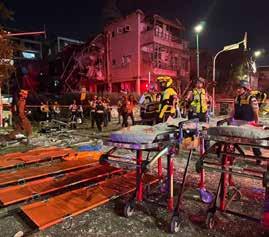
ship between the people of Israel and communities across the world. Never is this more evident than in a time of crisis.
So many people have asked, ‘What can we do?’ The answer is that you can do two things – and Israel needs them both. Urgently.
1. By far and away the most pressing need right now is to replenish Israel’s

blood supply. As Israel’s only blood collection, processing and distribution organisation, this responsibility falls with Magen David Adom. If you have any family or friends in Israel (including anyone waiting to come home) please ask them to consider giving blood. More details of how to give can be found at mdauk.org/ giveblood
2. The cost of this extreme level of preparedness amounts to an additional £150,000 per day - over £1m per week. Anything you can do to help support MDA at this time will be greatly appreciated.
Right now, everyone can do something to make a difference. Incredibly, so many people already are.
Let me take this opportunity to thank you for your continued support of Magen David Adom. We all hope that this comes to an end very soon and that the hostages are returned immediately. In the meantime we know that you will be there for our brave lifesavers. Your generosity saves more lives.In the end, values are not slogans we hang on walls. They are choices we make, every day, in how we show up for one another, how we interact with others and how we behave on a daily basis. May we honour Dragan’s memory not only in mourning, but in our actions too. Sending love and strength to his family, from the Jewish Futures’ family.








ONE PEOPLE
Amid the current unprecedented threat to Israeli civilian populations, Yad Sarah teams are providing vital home health care and social assistance through a wide range of services and equipment, while maintaining the highest safety standards and adherence to Homefront Command restrictions.
Since the launch of Israel’s “Operation Rising Lion” against Iran, Yad Sarah’s Emergency Medical Hotline has responded to 2,207 emergency calls from across the country with life-saving assistance.
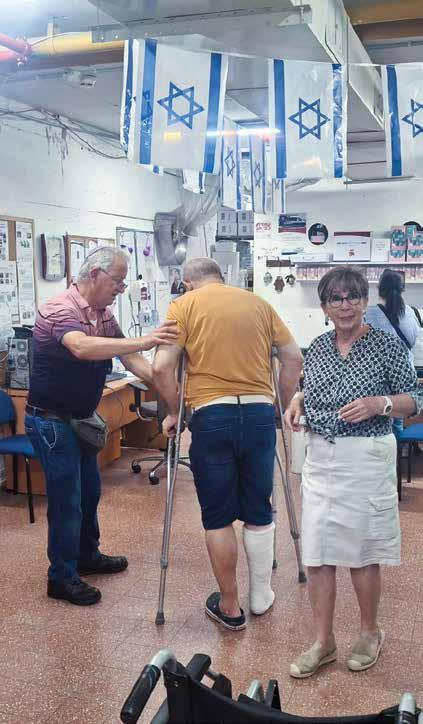
Please make your emergency donation today. Your support will provide immediate relief to thousands of Israelis — and help save lives.
BY ARNOLD AARON
With inheritance tax (IHT) affecting more and more families, smarter planning has never been more important. One particularly effective — yet often overlooked — strategy is whole-of-life assurance: a life policy that pays out a guaranteed sum on death, providing funds specifically to cover the IHT bill. This avoids the need to sell off cherished assets — such as investment property — to pay a 40% inheritance tax bill, a highly undesirable situation in which many families have sadly found themselves.
Whole-of-life assurance provides a guaranteed, tax-free payout upon death, provided the policy is held in trust. For example, a healthy, non-smoking couple aged 60 facing a £500,000 IHT liability could take out a joint-life second-death policy for that amount. One major life assurer currently offers this for a fixed premium of £6,200 per year for life. As long as the policy remains in place, their
children would receive the £500,000 upon both parents’ passing—ensuring they aren’t forced to sell cherished assets like investment properties to pay an inheritance tax bill.
These figures work for larger estates.
A £5 million IHT liability could be addressed with a fixed £60,000 per year in premiums. While the numbers certainly add up here - one would need to live until age 143 years before they’d have paid in premiums totalling the guarantee payout amount - there is a big consideration often overlooked.
Affordability....and having the cash flow to fund it every single year… for life. But how does one manage that, especially when those fixed annual premiums might be serious money?”
Industry data shows that around 60% of whole-of-life policies lapse within 30 years, often because policyholders struggle to maintain premium payments.
When this happens, not only are the premiums wasted, but the life cover vanishes—leaving beneficiaries to face the full IHT burden alone.
To solve this, we integrate a powerful trust-based solution: the Discounted Gift Trust (DGT).
The DGT allows individuals to gift a lump sum to a trust, which is then invested via a life company using cautious, smoothed investment funds. Each year, the trust returns 5% of the original gift back to the donor(s) - with no tax during the first 20 years. These annual withdrawals typically last for life and can be used to pay the life policy premiums.
Crucially, a portion of the gift becomes immediately exempt from IHT (perhaps 64% for a healthy 60-year-old couple), while the remaining balance falls outside the estate after seven years in the usual way.
Gift £100,000 to a DGT → receive £5,000 annually → fund £5,000 premium →
secure £400,000 in life cover. Gift £1 million → receive £50,000 annually → fund £50,000 premium → secure £4 million in life cover.
The original capital in the DGT, which should maintain its starting value (notwithstanding 5% withdrawals) remains in the trust for the next generation, and together with guaranteed the life assurance payout, this effectively turns £100,000 investment into £500,000—or £1 million into £5 million. That’s a 5x return for the next generation, without ever having to worry about how to fund the annual premiums!
This dual-structured approach brings peace of mind, certainty, and a significant financial legacy. It’s a solution we advise on comprehensively—from assessing IHT exposure to arranging the cover and trust—ensuring your wealth passes on as you intend. Our advice? If you’re in good health - grab this cover while you can! Arnold Aaron: 020 7692 0884 arnold@arnoldaaron.co.uk




Specialising in investments & tax planning for families and businesses for over 25 years.
• Strategies to mitigate IHT on primary residence
• Investments which you can keep in your name, yet swiftly ring-fence from IHT
• IHT efficient investments when acting for parents through a Power of Attorney
• Strategies to mitigate IHT on property companies & other assets
• Tax-Efficient Dividend Extraction Strategies
• Low-risk vehicles for surplus company cash with minimal corporation tax liability
• Pensions to reduce your corporation tax bill
• Shareholder Protection for Business Partners


The National Jewish Assembly (NJA) condemns the BBC’s latest string of antisemitic failures, which expose a disgraceful pattern of editorial negligence, deliberate provocation, and a systemic lack of accountability in its Arabic-language service. Among the most egregious examples, a BBC Arabic video claimed that Jews spit on Christians as part of a “holiday ritual” during Sukkot - a grotesque distortion of Jewish tradition that plays into centuries-old blood libels. Another article, published on the anniversary of 9/11, went so far as to liken ancient Jewish rebels under Roman occupation to modern jihadist suicide bombers, falsely linking the Sicarii with contemporary Islamist terror. Both pieces were eventually correctedbut only after more than a year and a half of pressure, and only after watchdog group CAMERA relentlessly pursued the BBC for accountability. These weren’t minor slipups. They were deeply antisemitic narratives given oxygen by one of the world’s most powerful media platforms. And they weren’t isolated either - CAMERA reports at least six additional unresolved complaints dating from before October 7, 2023.
NJA Vice Chairman Keith Rowe said:
“The BBC seems determined to prove, time and again, that it is incapable of learning from its own disgraceful record. These are not ‘mistakes’ - they are part of a culture that repeatedly seeks out fringe voices and antisemitic tropes, especially in its Arabic service, to score cheap narrative points at the expense of truth. The BBC wouldn’t dare allow comparable falsehoods about other communities. Why is it always Jews?”
Rowe continued: “That it took 19 months to correct such blatant falsehoods is bad enough. That these errors passed through editors, fact-checkers, and producers with nobody raising an alarm tells you everything you need to know about the editorial culture at the BBC. This isn’t journalism - it’s propaganda dressed in licence-fee respectability.”
The NJA calls on Ofcom, Parliament, and the BBC Board to launch an independent investigation into the editorial standards at BBC Arabic, and for urgent reform to prevent this from ever happening again. Enough excuses. British Jews deserve better.
LSJS (The London School of Jewish Studies)’ Invest in Education campaign smashed its fundraising target last week, raising over £400,000.
The 36-hour matching campaign, which started on Sunday 8 June, hit over 100% of its target, securing 1,222 donations from over 70 teams.
For 170 years, LSJS has been shaping Jewish learning and education, transforming generations and building stronger communities. Rooted in tradition and driven by innovation, they bring timeless Jewish teachings that are relevant to today’s world.
“At LSJS, we’re proud to create a space where Jewish learning is thoughtful, challenging, and deeply relevant, open to
complexity, and designed to bring people together across the community,” said Joanne Greenaway, Chief Executive of LSJS. “We are thrilled that the community has recognised the power of education and supported us in reaching our goal,” said Paul Gould, LSJS’ COO. “The funds we raised will enable us to continue training teachers across the community, run our BA and MA degree programs as well as our excellent Ulpan to suit all levels. We also provide world-class adult learning, including courses, events and tours with top global educators.
For more information, please email lsjsadmin@lsjs.ac.uk or call 020 8203 6427.

We’re in the business of improving people’s wellbeing. That’s why our free, stand-alone 50-minute online training sessions give you invaluable knowledge and skills to help you take care of yourself and others.
Self-Care and Stress Management
Reaching Out to Someone Who’s Struggling
Stress-busting Practical Relaxation Session
Introduction to Mental Health
Understanding Mental Health Conditions
Reaching Out to Someone Who’s Struggling WED


BY JEREMY SEGEL
Sitting at my desk in Ramat Beit Shemesh this week, I’ve felt the weight of being a travel agent in times of crisis — not just managing bookings or juggling itineraries, but acting as a lifeline for those desperate to get home or bring loved ones to safety. Since Israeli airspace closed on Friday morning due to the escalating war with Iran, my job has become real-time crisis management.
The phones haven’t stopped ringing. My inbox is overflowing. Many tourists in Israel are frightened and desperate to return home, while Israelis stranded in the UK or across Europe are equally frantic to get back to their families. Yet there are so few concrete answers to give them.
The closure of Israeli airspace was sudden, halting all regular air traffic. Since then, no official reopening date has been announced. For days, no flights were allowed in or out. Then, a small breakthrough: beginning Wednesday, EL AL started operating a limited number of rescue flights from select European cities, bringing stranded Israeli citizens home. It was a glimmer of hope — a sign that things may slowly begin to move again.
But these rescue flights are far from accessible to everyone. Only those with an existing EL AL ticket are eligible, and even then, they must register through a special link provided by the airline. Passengers are selected at random, meaning there’s no guarantee of when — or if — someone will get a seat. I’ve had clients refreshing their inboxes obsessively, waiting for confirmation. With such high demand, the backlog is enormous, and it may take considerable time to get everyone home.
So far, these flights have only been
bringing people into Israel. Tourists hoping to leave are still waiting for news. Many are anxious — running low on medication, juggling expiring visas, or just desperate to be back with their families. For now, we’re monitoring updates constantly, hoping for the announcement that outbound rescue flights will begin soon. Whereas some countries have laid on assistance for their stranded citizens, at the time of writing, we are unaware of any assistance being offered by the FCDO to UK Citizens apart from being asked to register with the British Embassy in Tel Aviv.
For those who absolutely must leave Israel immediately, there are some alternative — though complex — options. One is a land corridor: traveling to Sharm El-Sheikh in Egypt or Amman in Jordan, where commercial flights to the UK and parts of Europe are operating. These journeys involve several steps — often a taxi to the border, a crossing on foot or via shuttle, and another taxi to the airport on the other side. It’s far from easy, especially for families or elderly travelers, but for some, it’s the only way. There is also growing interest in a sea route to Cyprus. A limited number of sailings may be available, but until now have been limited and expensive. I am aware that the Israeli Ministry of Transport has been in contact with the Mano Cruise Line to try and arrange a sea route for stranded passengers but as of the time of writing, nothing concrete. From Cyprus, there are numerous flight options to the UK or other destinations in Europe
Looking ahead, once Israel’s airspace reopens, we expect regular flight service to resume gradually. Airlines will need time to reposition aircraft, reschedule crews, and accommodate thousands of displaced



passengers. It won’t be an instant return to normal, and I’m doing my best to prepare clients for that reality. Patience and flexibility will be key in the coming weeks. Working in travel is often about helping people plan their dream holidays. Right now, it’s about being a voice of calm in a storm, helping people get home safely or reunite with loved ones in a time of
BY LARA LIPSEY, UJIA CHIEF INCOME AND MARKETING OFFICER
“Behold, the Guardian of Israel never slumbers nor sleeps”. For over 600 days, the nation of Israel has barely slept soundly or uninterrupted, not just because of the immediate threat and need to run to a shelter but for the worry about family, friends and even people they’ve never met before. People are scared and scarred.
Our immediate priority it to protect our own, whether that’s physically with food and shelter, mentally with therapy and support and from afar with words and donations. For me, I felt the immediate tug on my heartstrings. A part of me ached with helplessness – I couldn’t just look on; I had to do something. When this began in October 2023, together with some very special people, now amongst my closest friends, we created a weekly vigil, a safe space to come
together to tell the heartbreaking stories of those who were captive in Gaza. And for those whose families they left behind and never said goodbye to, snatched so cruelly before their time. They went from a list of names to real people, and for the lucky few, now heroic, resilient and inspiring human beings we’ve been fortunate to meet since they’ve been released.
Why am I telling you this, you might ask? Well six months ago, my journey to support Israel and its people took a step up when I quit the corporate rat race and joined UJIA’s incredible team of real-life superheroes. This week I’m experiencing first hand the round the clock work they do to support both the British Jewish community to strengthen its identity and connection to Israel, alongside their immediate on the ground response to a crisis in Israel.
While Israelis have been under attack since 7th October 2023, the war with
Iran took things to another level, one we didn’t even know existed. As I write this, over 400 rockets have been fired at civilians across Israel, over 40 impact sites, 24 innocent people have lost their lives and over 800 people are injured. More than 3,800 people have lost their homes and close to 20,000 damage claims have already been reported. It’s unimaginable what this impact would look like without the sophisticated defence systems like the Iron Dome in place. Within a matter of hours our team on the ground, already sleep deprived from the sirens, kicked into action, working closely with our partners to assess the immediate needs including food and urgent supplies, psychological support and ensuring safe shelter. I hadn’t appreciated that so many buildings in low-income areas didn’t even have a functioning shelter. They had fallen into disrepair, with many piled high with rubbish that accumulated over many
uncertainty. From my office in Ramat Beit Shemesh, I feel the urgency of every call — and the deep responsibility that comes with each and everyone of my clients, but currently the options are still very limited. Jeremy Segel, a director of West End Travel made Aliyah with his family in September 2024 and works remotely.
years. People had been complacent, but not anymore – the threat was very real and the risk high. Since we launched our Israel Under Fire campaign, we’ve already deployed funds to support grassroots organisations like Community Makers (Osim Shchuna), with 40 shelters cleared so far and with another 1,000 to go, this important work is far from done. On reflection, what a 20 months it’s been, but there is still so much to do. When your passion and your work priorities align, you never slumber and never sleep as there is always more to do but I can at least rest easy that we are all working so hard to achieve the same goal. The safety and security of Israel, its people and a deep connection between us in the UK and our extended families in Israel. To donate please visit www. ujia.org/underfire
BY DEBBIE GOLDFISCHER
Since October 7, 2023, Israel has been fighting on multiple fronts—against Hamas in Gaza, Hezbollah in the north, the Houthis in Yemen, and other Iranian-backed forces in Syria. But with the launch of Operation Rising Lion, the war has now escalated into a direct and unprecedented confrontation with Iran itself.
In just a few days, Israel carried out a series of extraordinary, precision attacks on Iranian nuclear and military infrastructure—sites that Iran had spent decades developing. In retaliation, Iran and its proxies have launched hundreds of ballistic missiles and armed drones toward Israeli cities, military bases, and critical infrastructure. While most have been intercepted, some found their targets, causing immense damage to homes, buildings, roads, and facilities, and leaving thousands of families displaced. This marks one of the most intense military escalations in Israel’s history—not only in terms of firepower and range, but also in the level of threat to civilians in nearly every part of the country. While global attention is focused on defense operations, diplomacy, and humanitarian aid, the ripple effects of the Iran war are also being felt in Israel’s local real estate market. From halted construction and rental market shortages to shifting priorities among both Israeli families and foreign buyers, the housing landscape is under extraordinary pressure.
Here are 8 major ways the Iran war is already impacting Israel’s real estate market, according to insights gathered by Buyitinisrael:
1. Construction Sites Go Silent Since the launch of Operation Rising Lion, nearly all construction activity across the country has come to a standstill. Under current Home Front Command regulations, only “essential activity” is permitted in most areas. The construction sector—which was deemed essential during COVID—is now classified as non-essential, unless the site has on-site bomb shelters or has received explicit approval from authorities.
This means that excavation, crane operation, and all open-site activity are prohibited. As of mid-June, only about 5% of construction projects—mostly those nearing completion and with in-place protected spaces—have been allowed to operate.
Beyond the safety debate, the consequences of the shutdown are significant. Project timelines are being extended, delivery dates pushed off, and equipment is sitting idle.
As calls grow louder to safely reopen the sector, there is a broader takeaway too: the war has made it crystal clear that bomb shelters and reinforced safe rooms aren’t optional—they are lifesaving. Developers, regulators, and residents alike are being forced to reckon with the urgency of protection in every stage of planning and construction.
Even before this latest conflict, Israel’s construction industry was under strain. After October 7, the country lost access to tens of thousands of Palestinian workers who
had previously formed the backbone of onsite labor. To fill the gap, Israel has brought in foreign workers from countries such as India, Sri Lanka, and Moldova.
Now, many of those workers are asking to return home. Living in high-risk zones, with limited freedom of movement and shuttered worksites, they are anxious and idle. Others may hesitate to come at all, fearing for their safety in a country under fire.
This worsening labor shortage is a ticking time bomb for the industry. Without hands on deck, even when construction resumes, the pace of building will be significantly slower. Expect longer delays, rising costs, and greater difficulty completing projects on schedule.
While construction has ground to a halt due to the Iran war, the real estate slowdown didn’t begin with Operation Rising Lion. Even before the escalation with Iran, the housing sector was showing signs of strain. In the first half of 2025, building permits and project launches dropped significantly as developers grew cautious in the face of weak demand, rising costs, and prolonged uncertainty following the war that began on October 7, 2023. And now, housing starts are expected to fall even further due to halted construction sites, worker shortages, and regulatory slowdowns.
But interestingly, the dominant story in recent months has been the oversupply of unsold new apartments. According to the Central Bureau of Statistics, by the end of April 2025, there were approximately 79,410 new apartments available for sale—a 20.5% increase compared to the same time last year.
So while supply is high now, the war with Iran means we’re no longer replenishing that supply for the future. If construction continues to stall, we may eventually reach a point of rebalancing—or even shortage— especially in high-demand areas.
In short: the current market is a rare moment of oversupply, but that window may not stay open for long.
With close to 450,000 Israeli reservists called up and millions of citizens living under threat of rocket fire, real estate transactions have dropped sharply. Buyers are distracted, sales offices are closed, and mortgage banks and attorneys are operating at reduced capacity.
However, this slowdown is not a reflection of diminished need. On the contrary—demand for housing is rising, as thousands of residents are displaced and homes in active or high-risk zones are rendered uninhabitable.
There is also a growing emotional urgency. Many families—especially those with young children or the elderly—are actively planning moves to safer neighborhoods or homes with better protection. In some cities, local authorities have begun receiving requests to expedite building permits for home fortifications and to support emergency relocation efforts.
Once the immediate fighting subsides, we
expect a resurgence in sales activity, as both local and foreign buyers act on long-delayed decisions.
5. Rental Market Squeezed by Safety Concerns
Summer is traditionally the busiest season for rentals in Israel. Families relocate before the school year, students search for apartments, and many leases reset in June and July. But this year, the regular churn has collided with crisis.
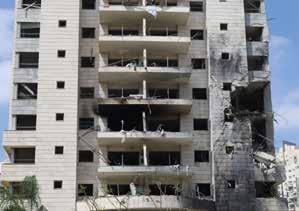
Thousands of families across the country have had their homes damaged or destroyed by direct hits, shrapnel, or nearby blasts. Even more are choosing to leave apartments that lack proper protection, especially those built before the 1990s, which often lack a mamad (reinforced safe room) or any secure shelter space. For many renters, safety has become more important than square footage or even location.
The result is a massive surge in demand for rental properties that offer a mamad. Across the country, competition is fierce. Prices are rising, supply is vanishing, and landlords are fielding multiple offers within hours of listing.
6. Foreign Buyers Shut Out—But Poised to Return
As of mid-June, Israel’s skies remain closed, and the uncertainty has frozen travel plans for thousands of Diaspora Jews. Families who had planned trips have been forced to put everything on hold. But the interest hasn’t disappeared—it’s growing.
Since October 7, there has been a notable increase in overseas buyers viewing Israel as a safe haven. People who never previously considered purchasing a home here are now looking for footholds—ways to plant roots in the Jewish homeland, protect their families, and their money.
Buying a home in Israel has become not just a luxury, but a backup plan. And as the war continues, we’re seeing that intention deepen. More and more Jews around the world are thinking seriously about buying, many for the first time ever. Real estate, once considered a dream for retirement or vacation, is now being viewed as a form of security, continuity, and identity.
7. Strong Dollar—But the Shekel Is Rebounding
After the outbreak of Operation Rising Lion, the Israeli shekel weakened sharply, hitting around NIS 3.61 per USD, giving foreign buyers a rare window of opportunity with stronger purchasing power.
But that window may already be closing. Over the following days, the shekel rebounded, strengthening to about NIS 3.50 per USD—its strongest level since late 2023. That means U.S. buyers now get fewer shekels per dollar, making Israeli homes more expensive in dollar terms than they were just days ago.
But while the shekel’s recovery may dampen the currency advantage, it also signals confidence in Israel’s economy, which should reassure long-term investors.
8. What’s Next? A Window of Opportunity
In the short term, the Iran war is softening the real estate market in Israel. Sales volumes are down, inventory is up, and many developers are sitting on unsold units. To keep projects moving and maintain stable cash flow, we expect to see more incentives, discounts, and flexible payment terms—especially in areas with high volumes of new construction and limited safety features.
Meanwhile, construction has slowed dramatically. Across the country, projects are frozen. From Tel Aviv to Beit Shemesh, from Ashkelon to Haifa, hundreds of thousands of square meters are sitting in limbo. Labor shortages, material delays, skyrocketing insurance costs, and war-related uncertainty are choking the future supply of housing. At the same time, thousands of families whose homes were destroyed or severely damaged will be urgently seeking alternative housing. And it’s not just those directly affected—many others living in older buildings without safe rooms are actively trying to relocate to more secure homes. The result is a market under intense strain.
Over time, this combination of reduced supply, rising construction costs, and increased demand—both for rentals and for purchases—will likely place upward pressure on prices, especially in strong, supply-constrained markets.
At Buyitinisrael, we believe the next phase of the market presents a rare and delicate mix of uncertainty and opportunity. Prices in some areas may ease. Developers may be more open to negotiation. And for those who have been waiting for the right moment to buy, even from afar, this could be it. While for displaced families, it’s not about timing—it’s about survival, stability, and rebuilding. And for renters, it’s becoming a race for safety and availability.
Debbie Goldfischer is the founder and CEO of Buyitinisrael and host of the Israel Real Estate Podcast: On The House. A prominent figure in Israeli real estate since 2004, Debbie has spent the past two decades helping foreign buyers successfully navigate the property market in Israel. In 2020, recognizing the lack of reliable English-language resources, she launched Buyitinisrael.com, which has quickly become the leading platform for English speakers looking to buy property in Israel.
In addition to leading the platform, Debbie personally assists buyers in finding the right property—whether new or resale—anywhere in Israel.
To get in touch, email debbie@buyitinisrael.com.




BY RABBI YONASAN ROODYN
This past week, I had the tremendous privilege of leading a group from Shaarei Shomayim Shul in Toronto on a six-day immersive journey across the UK. Organised by JRoots and accompanied by their Rabbi, Sam Taylor, this was more than a tour. It was a powerful exploration of Jewish history, memory and meaning, embedded in some of the most iconic sites across Britain.
We began at Windsor Castle, the oldest and largest inhabited castle in the world. Windsor gave us a majestic starting point and a context for understanding how far Anglo-Jewry has come, from the margins of medieval society to respected members of modern British life.
From Windsor we travelled to Bletchley Park, the once-secret headquarters of the British codebreakers. It was here that we uncovered the stories of Hashem’s guiding Hand behind the scenes of history, learning about the linguists, mathematicians and cryptanalysts who helped turn the tide of World War II. Standing in the huts where messages were decoded and destinies reshaped, we spoke about Jewish values of responsibility, moral clarity and the quiet power of intellect in service of the greater good.
In York we took in the various Jewish and historical sites with a walking tour and stood at Clifford’s Tower, the site of the tragic massacre of 1190 where an entire Jewish community gave their lives al kiddush Hashem. We prayed, sang reflected on the pain, courage and unbreakable faith that defines so much of our collective history. It was a deeply emotional experience and a reminder that
our survival has always been about more than endurance. It has been about purpose.
The Tower of London offered another window into the complicated relationship between Jews and the state. We explored the stories of Jewish financiers imprisoned under King Edward I and considered how close Jews have often lived to the centres of power while also remaining vulnerable to the winds of history. Standing in a place once associated with fear and persecution, we found ourselves reclaiming the narrative with pride and presence.
From there we made our way to the House of Lords, where we were privileged to be addressed by Lord Pollack. It was inspiring to see Jewish values finding their voice in the heart of modern governance. We discussed the importance of moral leadership and the Jewish contribution to the fabric of British society.
Our journey continued to the historic Willesden Cemetery, known as the House of Life, where we visited the resting places of some of Anglo-Jewry’s most significant figures. Among the gravestones we found the names of Chief Rabbis, communal leaders, philanthropists and pioneers who shaped Jewish life in Britain over the past two centuries. The beauty and dignity of the site reminded us that true greatness often rests in lives lived with quiet dedication and unwavering commitment.
From there we travelled to Oxford, where we were privileged to be guided by Rabbi Eli Brackman of Chabad. Walking through ancient colleges and narrow lanes, we explored the city’s rich and often hidden Jewish story, dating back nearly a thousand years. We stood on the site of the medieval Jewish quarter and discussed the interplay between Torah and academia, faith and philosophy,

exile and enlightenment. Rabbi Brackman’s insights brought the past to life and challenged us to think about how Jewish values can elevate even the most intellectual spaces.
At the British Museum, we connected the artefacts of ancient empires to the stories of Tanach. Babylonian tablets, Assyrian carvings and Persian artefacts, brought our story into sharp focus. These weren’t just objects in a display case. They were living reminders that the Jewish story is deeply embedded in the story of civilisation itself.
Shabbat in Central London was one of the highlights of the trip. Hosted by the welcoming local community, we experienced meaningful davening, uplifting meals and heartfelt divrei Torah. There is something uniquely special about spending Shabbat together in a place rich with Jewish history and surrounded by friends old and new.
We concluded our journey in the Cabinet War Rooms, Churchill’s underground nerve centre during the Second World War. In the dimly lit rooms where decisions were made and destinies shaped, we reflected on courage both in and out of uniform. It was a fitting place to end a week filled with memory, meaning and mission.
This was more than a historical tour. It was a journey through the soul of Anglo-Jewry. The UK is full of incredible sites of Jewish heritage just waiting to be explored. They are not relics of the past but living encounters with who we were, who we are and who we are meant to be.
For more information about JRoots UK tours please email rjr@jroots.org
Should we believe that injecting many more billions into the NHS will reduce the queues and improve patient waiting times?
The change to a Labour government has certainly caused everyone to think more confidently about the NHS, after all, it was their creation. However, as if berating an errant child, the government declared that there will be no more money without improvement.
As we have seen with the winter fuel allowance, and with train drivers’ pay, Government U-turns are not out of the question. As we move further away from the last election and nearer to the next, will further wild-cat NHS strikes and pressure from an economic downturn signal the biggest shake-up of the country’s most loved and venerated institution since its inception in 1948?
The health secretary has said that the NHS is not fit for service. If that is true, then should we be running to the nearest private health broker for advice and emotional support? My own position is that we actually need both. The NHS trains to the highest medical standards, but capacity, rather than capability hold it back.
We help train overseas health workers in our expertise, earn revenue from our health tourism, and yet we can’t seem to figure out the NHS’s optimum shape and structure.
When a client was told by his consultant that he would have to wait months for a procedure, he booked in for the following week through his health insurer. However, women’s and men’s preventative health screening has been steadily increasing throughout the NHS, in so many areas, so we should use itwhen offered.
The NHS budget by 2028 is projected to be £229 billion, but how does that help if we have to wait a year for a hernia operation or perhaps two years for a hip replacement, and then witness the new funding sink without trace. So, with private cover, we can select our consultant, our hospital, and the date for an appointment, which is all very appealing. And when we realise that the NHS still relies on fax machines, (The Times, 16 June) I’m still inclined to recommend renewing the family health cover for another year.
For lots of free advice and help, Trevor Gee, patient Health 020 3146 3444
GIFT has extended its reach to Gibraltar for the very first time, delivering an intensive series of educational sessions designed to inspire young people with the values of giving and kindness.
Rabbi Zeidman travelled to Gibraltar for a jam-packed two-day visit, running 12 sessions across the primary school, girls high school and boys high school. During the visit, he successfully completed the full Year 5 Giving Speech course and launched the Year 6 Foundations of Giving course, teaching the first three parts in person. The Year 6 course is now continuing remotely over Zoom to ensure the full programme is completed.
Alongside the classroom sessions, Rabbi Zeidman led two highly interactive supermarket challenges, engaging students from Year 7 up to Year 11 in hands-on learning about budgeting, empathy and responsible giving. Even Gibraltar’s famous monkeys made a surprise appearance, attempting to snatch the food
the students had purchased.
Originally brought over by the primary school, Rabbi Zeidman’s visit quickly became a community-wide experience, with a warm welcome from schools, students and families. “It was incredible to see how eager the entire community was to get involved. I felt completely at home,” he shared.
This landmark visit marks an exciting new chapter for GIFT as it continues to grow internationally, empowering young people to become lifelong givers.

To get the best value from your private medical insurance, you should speak to an expert who is qualified to advise you on the right policy for you, and recommend the providers who offer the most competitive premiums. This advice covers individual, family and company policies, and is always FREE.
As an independent health insurance expert, I work with the healthcare insurers to provide you with the appropriate and most affordable level of cover. So whether you have an existing policy or not, let’s have a chat.



By Rabbi Gideon Goldwater
What does it really mean to live life “first class”? Is it about private jets, five-star resorts, or making partner at a top firm before 30? Or is there a deeper, more real version of “success” that most of the world has forgotten to consider?
These were the questions we posed to a group of 40 Aish UK university students on a recent whirlwind journey through Manhattan, the Five Towns, and Miami on a trip themed Upgrade: Living Life in First Class. But this wasn’t a luxury vacation. It was a deep dive into the heart of what truly matters.
We began in the shadows of the tragedy of 9/11 at Ground Zero. As the students read through final messages from those trapped in the Twin Towers, there was an eerie clarity: not one person said, “I wish I’d closed that deal,” or “If only I’d worked harder.” The final words were all the same. “Tell my family I love them.” “Tell my kids they made me proud.” In moments of
absolute truth, the smokescreen of status and wealth vanished. What remained was love, connection, and values.
From there the group ascended, both literally and metaphysically, to the top of the One World Observatory. The view was breath-taking. Below us stretched the vastness of Manhattan: the epicentre of finance, fashion, media and human power.
Times Square dazzled. Screens screamed status, success, and consumption. It is the pinnacle of modern material achievement; the perfect backdrop to ask: Is this it? Can the pursuit of pleasure, luxury and recognition really satisfy a human soul?
Our journey took a sharp turn as we moved from the relentless energy of the city to the serenity of suburban Jewish life in the Five Towns. There, in warm homes and welcoming community centres, students were exposed to another kind of ambition. Families where Torah learning is central. Homes filled with purpose, children raised with clarity, and a communal rhythm rooted in values, not vanity.
They spent mornings learning Torah and grappling with Jewish texts, and afternoons experiencing what “upgrading”
can look like when values remain the compass. One highlight was our time with Mr Harry Rothenberg, a leading personal injury attorney who reminded us that no matter how successful you are professionally, your integrity and Jewish identity are what truly define you. “You want to succeed?” he said. “Don’t just work harder. Work for something that matters.”
Another afternoon we toured the American Dream complex, a shopping and entertainment centre so vast it defies imagination. Its developer, Mr Baruch Ghermezian, guided us through his world of mega-success. But when the group sat down with him, his message wasn’t about money or management. It was about values. “My strength in business,” he told them, “comes from my strength in Yiddishkeit. Never compromise on who you are!”
Before returning to the UK, we squeezed in a visit to Monsey for a dose of spiritual strength from the inimitable Rabbi YY Jacobson. With his trademark depth and humour, he challenged our students to live courageously, not comfortably. “Your soul doesn’t want easy,” he said. “It wants
And then, Miami. Shabbat in a resort, sun glistening on the waves, the perfect setting to reflect. The discussions turned to the trip’s theme: Upgrade. But the students weren’t talking about flights or hotels anymore. They were talking about upgrading their decisions, their direction, and their definition of what a good life looks like.
This wasn’t just a trip. It was a wake-up call. In a world obsessed with what they have, and what they want, they rediscovered who they are. The message couldn’t be clearer: First class isn’t where you sit on a plane. It’s how you live your life.
Rabbi Goldwater holds a BSc in Psychology and an MA in Jewish Education and spent two years living in Birmingham as the Aish Rabbi on Campus. He went on to direct Aish’s national Campus programme before taking on his current roles as Managing Director of both Aish UK and Jewish Futures. He has overseen the expansion of the teams and programming that are currently impacting over 20,000 young Jews across the UK.

• Suits all half price
• Sports jackets all half price
• Polo shirts £15 each 2 for £20
• Summer casual Jackets from £29.50
• Trousers £20 each 2 pairs £35 up to 50 inch waist
• Shirts £15 each and 2 for £25




Dear Rabbi ,
Let me get this straight: Iran funds terror across the globe, openly calls for Israel’s annihilation, develops nukes while chanting ‘Death to America’ and the world rushes to negotiate. Israel finally defends itself, and suddenly we’re the warmongers? Is there a secret clause in the Torah that says Jews aren’t allowed to fight back without a UN permission slip?”
Roye
Dear Roye,
You’ve just described the modern-day playbook for anti-Israel double standards. Iran funds Hezbollah, Hamas, Islamic Jihad - terrorist franchises with one job: to murder Jews. They chant “Death to Israel” on Fridays and develop nuclear capabilities the rest of the week. And yet, somehow, when Israel dares to defend its citizens, it’s Israel that gets hauled before the court of global opinion.
Why? Because the world has a convenient memory. It forgets the Holocaust but remembers every Israeli airstrike. It forgets the thousands of rockets fired at civilians but zooms in on the one building Israel hits that CNN finds photogenic. Jews
bleeding? “Complicated conflict.” Jews defending themselves? “Disproportionate response.”
But let’s be clear: Judaism is not a suicide pact. The Torah commands us, “If someone comes to kill you, rise up and kill him first.” That’s not bloodthirst. That’s self-preservation with a moral backbone. And when Iran - a genocidal regime that funds terror and represses its own people - threatens the only Jewish state on earth, Israel has not just the right but the obligation to act.
So no, we don’t need a UN permission slip. We already have 3,000 years of Jewish history reminding us what happens when we wait for the world to defend us. This time, we don’t wait. We rise. Like a lion!
Dear Rabbi ,
The Mishnah in Avot warns us not to rely on governments, saying they only befriend us for their own benefit. So how is it halachically or even strategically acceptable that Israel leans so heavily on the U.S.? Aren’t we basically holding hands with a superpower that could drop us the second it’s politically convenient?
Paul

Dear Paul You’ve touched on a tension as old as Jewish exile and as current as the next U.S. election. Let’s be real: Israel’s alliance with the U.S. has brought immense benefit: Iron Dome funding, diplomatic backing, military coordination. But make no mistake: Washington stands with us... until it doesn’t. Administrations change, interests shift, and in the end, America will do what’s best for America. That’s not betrayal. That’s politics.

Halachically, there’s no prohibition against strategic alliances. Yosef partnered with Pharaoh. Daniel worked for Nebuchadnezzar. Mordechai sat at the king’s gate. But they never confused diplomacy with dependency. They never forgot who runs the world - and it wasn’t the empire du jour.
The danger lies not in receiving aid, but in believing it is our lifeline. The Torah says “G-d alone shall you fear… and Him
shall you trust.” Israel’s strength doesn’t come from Congress. It comes from conviction and belief in the One Above, not the shifting sands of Capitol Hill. So yes, be grateful for allies. Shake hands. Smile for the cameras. But never bow. Never hinge our survival on the goodwill of others, even as we ought to be eternally grateful for their support. Because when the phone line to D.C. goes quiet, it is the hotline in Jerusalem - straight to Heaven, that is always open.



By Rabbi Judah Mischel
Following the fall of the Iron Curtain, a massive number of Russian Jews, largely uneducated in Jewish tradition, emigrated to Eretz Yisrael. With loving concern, Rav Avrohom Pam zt”l, one of the gedolei haDor and rosh yeshiva of Torah v’Daas in Brooklyn, founded “Shuvu”, a network of schools that provides Russian immigrants to Israel a comprehensive Torah education. Toward the end of his life, physically frail, yet working tirelessly to raise funds and awareness on behalf of Shuvu, Rav Pam gave of his time and effort to save a generation of Jewish children.
At one point, facing a budget crisis, one of the schools seemed likely to close. The kids would most likely end up back in the
Management consultants were urgently summoned, and experts analyzed the financial situation and demographics to determine the viability of the school. In the end, they found that the resources had been exhausted, and they regretfully recommended that the fledgling yeshiva close.
He was known for his mild-mannered, gentle demeanor, but now the gadol was incredulous. “Our tafkid, our duty here, is not to determine IF this project is viable,” fumed Rav Pam, “it is to ENSURE that it is viable – and to make it happen!”
Our sedra recounts the story of the meraglim, as they were dispatched to spy out the Promised Land, and to return with their findings. Were the residents there strong or weak? Were they few or numerous? Were the cities there open or fortified? What was the topography like?
does indeed flow with milk and honey… However, the people who inhabit the country are powerful, and the cities are fortified and very large… We cannot attack that people, for they are stronger than us… That land… is one that devours its settlers. All the people that we saw in it were men of great size;… we looked like grasshoppers to ourselves, and that’s how we must have looked to them.”
The Ramban asks, ‘Why are the meraglim punished? Should they be criticized for reporting the truth?
Weren’t they only presenting the facts from their perspective?’
The Lubavitcher Rebbe (Likutei Sichos, Vol. 13) teaches that it would have been legitimate to discuss and analyze in natural terms how Bnei Yisrael could potentially enter the Land. For example, they could have reported that they were outnumbered by their adversary, and that they also apparently had advantages

in skill and power. However, their focus changed to an issue of whether or not they could achieve their mission. This did call for rebuke.
The Rebbe tells us: a Jew doesn’t ask ‘if’ only ‘how’. We all face regular nisyonos in our personal lives, whether at home, at work, or in our avodas Hashem and development of middos. When we are faced with a challenge, however, ‘how’ can we see it as an opportunity? We have already been assured that Hashem is with us – we are not called to ponder and determine this. We must shift our perspective from ‘if’ we’ll be able to accomplish or not, to ‘how’ we will achieve our goals.
Rabbi Judah Mischel is Executive Director of Camp HASC, and Mashpiah of OU-NCSY. He is a member of Mizrachi’s Speakers Bureau (www.mizrachi. org/speakers).
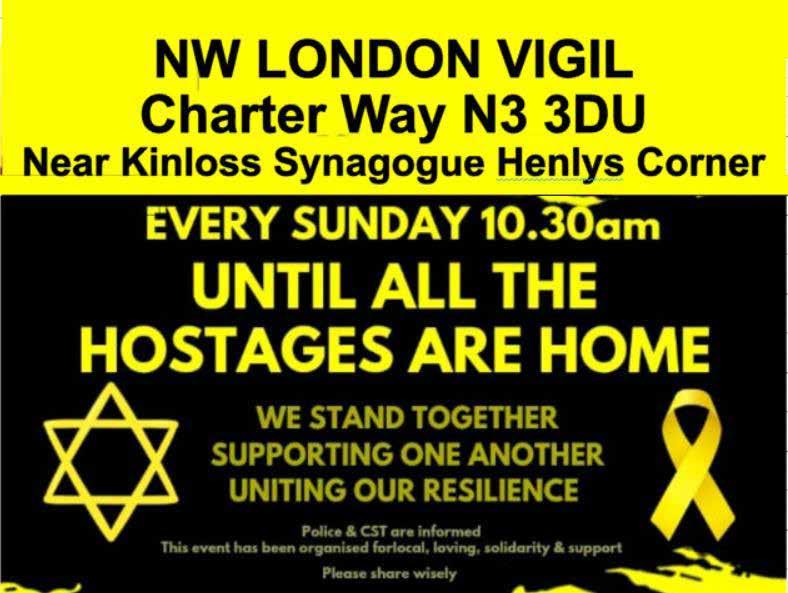

BY RABBI MOSHE TARAGIN
We often think of faith in Hashem as something instinctive—either we have it or we don’t. But emunah isn’t just a feeling or an inborn trait. It’s a choice. Faith is a decision.
We look at a challenge, reflect on what we’ve seen and experienced, and then we decide: to believe or not to believe. Emunah isn’t predicated upon complete clarity or certainty. It is merely a decision to trust—even when full understanding isn’t possible.
In certain instances, the decision to have faith shapes our course of action. We rely upon Emunah to carry us forward—to walk us across the bridge of fear and uncertainty. When we can’t summon that faith, we become paralyzed and stuck, unable to move forward or reclaim our vision.
Such was the situation thousands of years ago in the desert, as we stood on the doorstep of Israel—poised to enter Eretz Yisrael and make history. The fairy tale of leaving Egypt, of marching through the dry sea, and of eating heavenly “man” was suddenly threatened by a harsh reality: Eretz Yisrael was inhabited by mighty nations and overshadowed by giants. We could not simply waltz into this land. The land of Hashem would not be easily claimed.
Had we summoned emunah, we would have pressed forward and altered the course of history. Instead, we flinched, faltered in our faith, and rerouted our desert journey for forty long years. Had we mustered faith we would have been emboldened to choose a different course of action.
There is a second kind of Emunah—not the kind that helps us choose between paths, but the kind we need when no other path exists. Sometimes, life doesn’t offer us alternatives. Instead, we must draw on our faith and inner strength to face the only road before us.
At the Yam Suf, we were trapped—cornered between the advancing Egyptian army and the raging sea. Though some may have considered returning to Egypt, that was not a real option. We would have faced brutal persecution for our attempted rebellion. The Egyptians would have made an example of us to crush any future hope of escape among other slaves.
Our only chance—though it seemed beyond reason—was to plunge forward into the sea. Empowered by faith, we turned resolutely toward the water and watched as Hashem split the sea, offering us a path through the impossible. Sometimes faith
helps us choose a direction. Other times it strengthens us along the only path available.
The past two years have demanded the second type of Emunah—the kind we summon when there are no choices left. On October 8th, we didn’t weigh options or calculate risks. We were staring down an existential threat to our country, forced to confront a grim and painful reality.
Yet through deep faith and national resilience, we awakened inner strength to rise from that trauma. We stood back up and delivered stinging defeats to our enemies on multiple fronts.
Currently, we face a similar moment of faith. As the Iranian regime inched closer to a nuclear weapon—one they openly threatened to use against us—we were left with little choice but to act. As I write these words, our cities are under brutal nightly missile fire, resulting in heavy casualties and deep sorrow. But what choice did we have? The civilian casualties only underscore how catastrophic the situation might have been had Iran gone nuclear.
Once again, this week we are left with no alternatives but to summon faith and confront this daunting challenge with courage, and unshakable resolve.
Despite its similarities to October 8th and the same kind of faith it demanded, this past week has felt different. The massacre of October 7th was followed by a wave of mass mobilization. Our entire nation ran to the front—to defend, to rescue, and to battle terror. An entire country, and much of the Jewish world, rallied to provide support—material, emotional, and spiritual.
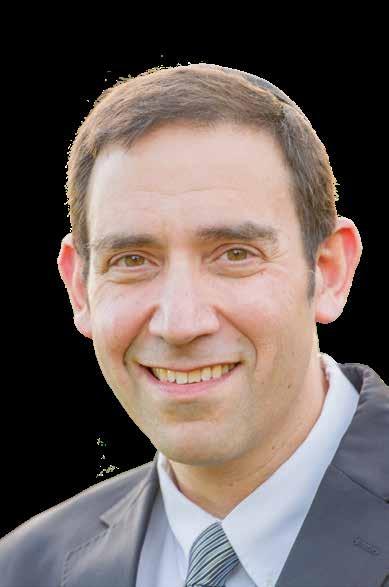
teams have spent the weekend pulling survivors and victims from the wreckage of missiles that targeted urban areas. Though many soldiers have been drafted, their current role—at least for now—is primarily pre cautionary, guarding against border infiltrations or violence in Palestinian towns. For most of us, there is little to do but hold on to faith, run ning in and out of shelters at all hours of the day and night. In some ways, this makes our faith even more powerful. We are largely helpless to affect the outcome. We are left with only tefillah and faith. It feels like a Yam Suf moment—binary and absolute—with nothing to do but to pray that Hashem con tinues to shield our skies from the hands of evil.
At the Yam Suf, we looked downward— toward the raging waves crashing against the cliffs—praying that Hashem’s hand would part the waters beneath our feet. Our faith was focused on the sea below. This week, our eyes have turned upward.

In those early days, our faith extended beyond the internal; it was made manifest through our actions, our unity, and our shared sense of purpose. We were engaged in a divine mission and a national calling. Our Emunah took tangible shape in the world—it was experienced, witnessed, and lived fully.
This week has posed a different kind of Emunah-challenge. Most of the current war is being waged by the Air Force and intelligence units. Tragically, rescue
We are glued to the heavens, listening to the roar of Air Force sorties and the sharp cracks of missile interceptions overhead. It all feels uncannily prophetic and déjà vu. Hashem struck Egypt from above during the plague of barad. He addressed us with a booming voice from the heavens at Sinai. He halted the sun for Yehoshua as we prevailed against our adversaries.
For Jews, moments of crisis often turn the heavens into the stage of divine intervention. Though we have endured painful losses and taken heavy blows, the tools Hashem has placed in our hands have shielded us from far greater devastation. As the battle moves from Azza’s sands to the skies above Tel Aviv, our faith
rises—perhaps more fragile, but sharper—focused not on what we can do, but on what we must patiently await.
This week also feels more Biblical. Our war with Hamas is being fought to defend our homeland and secure a safer, more peaceful future for our children. It is a war of necessity, grounded in territorial defense. Though Hamas represented a deeply immoral ideology—one that has, tragically, infiltrated and poisoned broader circles of society—it posed no immediate existential threat to the larger world. Iran is ruled by madmen cloaked in the garb of religion. There is nothing sacred about men who murder their own citizens and feel no pang of conscience in targeting innocents. Though much of the world still refuses to admit this, we once again find ourselves saving them from their own moral blindness and inability to confront evil. If Iran obtains nuclear weapons, the threat it poses will extend far beyond our borders—endangering all of humanity.
This week it feels as if we are reliving the mission of our grandfather Avraham, who was called Ivri—willing to stand on one side of the river alone, with clarity and conviction. Once again, we stand alone. We hope others will join us, but even if they don’t, we remain determined to rid the world of this menace.
The writer is a rabbi at the hesder Yeshivat Har Etzion/Gush, with YU ordination and an MA in English literature from CUNY. His books include the recent “To Be Holy but Human: Reflections Upon My Rebbe, HaRav Yehuda Amital” available at mtaraginbooks.com





V
5
Asking

Asking Price:
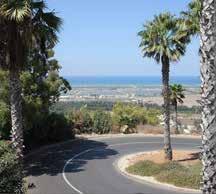







BY RABBI NAFTALI SCHIFF
The timing is uncanny.
As we reflect on the core value of HUMILITY - הונע this week, we do so at a moment of striking military, strategic, and psychological ascendancy for the State of Israel. In recent days and weeks, a string of both overt and clandestine operations has placed Israel’s military capabilities, that of the IDF and the Mossad, at the very pinnacle of global attack precision and deadly espionage. From pinpoint drone strikes deep into enemy territory to high-value assassinations and surgical bombings, a message has been broadcast loud and clear: the Lion of Israel has risen with a mighty roar: Israel’s global deterrence has been restored.
The ripple effect is undeniable. Hezbollah and its leadership in Lebanon have been systematically exposed, humiliated and eliminated. The nefarious Assad regime in Syria, long protected by layers of foreign influence, has crumbled into irrelevance. Hamas, the cruel puppet of foreign powers in Gaza, has been pushed to the edge of collapse. Once unreachable despots such as Nassrallah, are now consigned to a special place by the side of Hitler, Hussein and Sinwar. Evil demagogues, who have long exported international vitriol and terror, are today increasingly isolated, fearfully awaiting their turn.
These are victories of intelligence, resilience, and extraordinary human capability. But they are also monumental tests for all of Am Yisrael.
Because if there’s one thing history has taught us, both Jewish and global, it’s that nothing clouds clarity like victory. Pride is a subtle intoxicant. It masquerades as confidence, but it corrodes from within. And just when success seems most assured, the ego whispers: “Look what I have built.”
It is precisely at such moments that Torah wisdom pulls us back from the edge. Much as last week the prophet Zecharia in the haftorah continues to inspire us across the millennia by the vision of a menorah of fire messaging
- “Not by valour, nor by physical prowess, rather by the spirit of Hashem, so does this week’s Torah portion recount a similar perspective by way of the tragic episode of the spies. Twelve leaders of tribes, men of status, who, according to some, fail to see the Land of Israel through a sufficiently spiritual lens. Many commentators explain their error as
rooted not in military fear, but in personal insecurity. They feared losing prominence once the people transitioned from desert to destiny. They resisted not the Land, but the humility of leadership it demanded.
The Zohar offers an important insight: the Land of Israel is not randomly called Eretz Canaan - ןענכ. The name Canaan derives from העינכ, submission , the state of being of those worthy of inheriting it. The Zohar writes:
exceedingly humble.״
The doubling of “דאמ דאמ” in both phrases isn’t accidental. The Land and the person demand the same orientation: dignity, not arrogance. Sensitivity, not self-importance.
It was noted this week that even the most sophisticated drone, the most complex intelligence network, cannot detect pride. However, every discerning adult and child can and its damaging influence can only be genuinely uprooted from within. Nowhere is this truer than in leadership, of a nation, a movement, or of oneself.
And the Gemara in Sotah 5a is stark in its exposure of its disdain for haughtiness
“Anyone who possesses arrogance I and he cannot dwell together in the same world.”
There is no spiritual coexistence with arrogance. G-d makes room only where the ego recedes.
“The Land of Israel is called the Land of Canaan because it belongs only to the humble, to those who see themselves as nothing before G-d.”
The Land itself is allergic to arrogance. It responds only to those who recognise its uniquely G-dly nature and their own smallness in the face of G-d’s plan.
Long have we recited the famous Psalm -
I lift up my eyes to the hills (to the Creator and Sustainer of all natureMy help shall come from a place of ןיא a place of humble subjugation to the Almighty. Crucially, we must understand that humility does not imply insignificance. Rabbi Noah Weinberg defined humility as objectivity. Not thinking less of yourself, but thinking of yourself less. It means recognising and harnessing your strengths, yes - but also understanding they are not yours to hoard or self adulate . They are not tools of your creation but gifts from Heaven for the fulfilment of your purpose on Earth.
Moshe Rabbeinu, the greatest of all leaders, is praised not for his might, charisma, or speech. He is described in one defining line:
The man Moses“ — ”דאמ ונע השמ שיאהו“ was exceedingly humble ״
He led, but never postured. He stood tall, but never claimed the spotlight. That is why he was entrusted with leading us to the Land of Canaan , the land of humility. Avraham Avinu the father of nations said of himself: יכנא - my ego is but “רפאו רפע“ dust and ashes.

What a counterbalance to today’s oft emblazoned headlines. What a reminder to every leader and citizen alike:- Brilliance may win the moment , but humility will sustain the mission!
The description of the Land of Israel by the Torah echoes this connection in telling us:
The Land is ex-“ - ”
“ ceedingly good.” words clearly resonating with the sage advice in Pirkei Avot
Not out of low self-esteem, but out of clarity. He understood that his greatness was a Divine mission, not a personal accomplishment.
The mighty Warrior King David sets the tone for us in Tehillim 37,
And the humble“ — ”ץרא ושריי םיוונעו“ shall inherit the Land.״
This is not metaphor. It is pre requisite and it is prophecy. Humility is not weakness; it is the condition necessary for our spiritual endurance and national destiny.
The famous ן״במרה תרגא Iggeret HaRamban, Nachmanides’ ethical letter to his son, frames humility as the gateway to everything:
Place humility upon your heart for it is the most worthy trait of all…When you are constantly mindful of humility in your heart, and cogniscent of where you come from , where you are ultimately headed and before whom you will eventually give reckoning, you will live with joy and be happy with your lot….
Humility clears the way for a life well lived in harmony with G-d and with man.
At Jewish Futures, this value isn’t just a theological construct or a philosophical stance. As with our other core values, it’s an aspiration of how we would like to constantly grow, live and operate in all areas of life. It shapes how we run our organisations, design our initiatives, lead our teams, interact with one another and with the broader community. Humility is not optional; we believe it is the only culture in which real education, impact, and inspiration may take place.
We live in a time when noise is rewarded. Platform is everything. Perhaps this phenomenon cannot be avoided. However, Judaism calls us also to nurture something quieter but deeper. Something eternal. So yes, we celebrate bravery, victory and success. We acknowledge the brilliance. We admire the intelligence, the coordination, the excellence of our people, the IDF and the leadership. However, we must recognise the Source, the Almighty to whom all thanks is due.
ךל ונחנא םידומ - Today, let us together recite Psalm 100- הדותל רומזמ - Thank you Hashem!
Let us not be fooled or seduced by the moment.
Let us not forget that our Land is not conquered by ego, but sustained by humility. Let us never lose sight of the voice that echoes across generations from Torah, from the Prophets, from our very soil:
Less is more.

///What3Words is a geocoding system that has divided the world into a grid of 57 trillion 3-by-3 squares, each of which is identified by a unique three-word address. In this column, Rabbi Naftali Schiff reflects upon three words each week, relating to core issues of the day. Feedback welcome! nschiff@jfutures.org
Rabbi Naftali Schiff is the Founder and Chief Executive of Jewish Futures




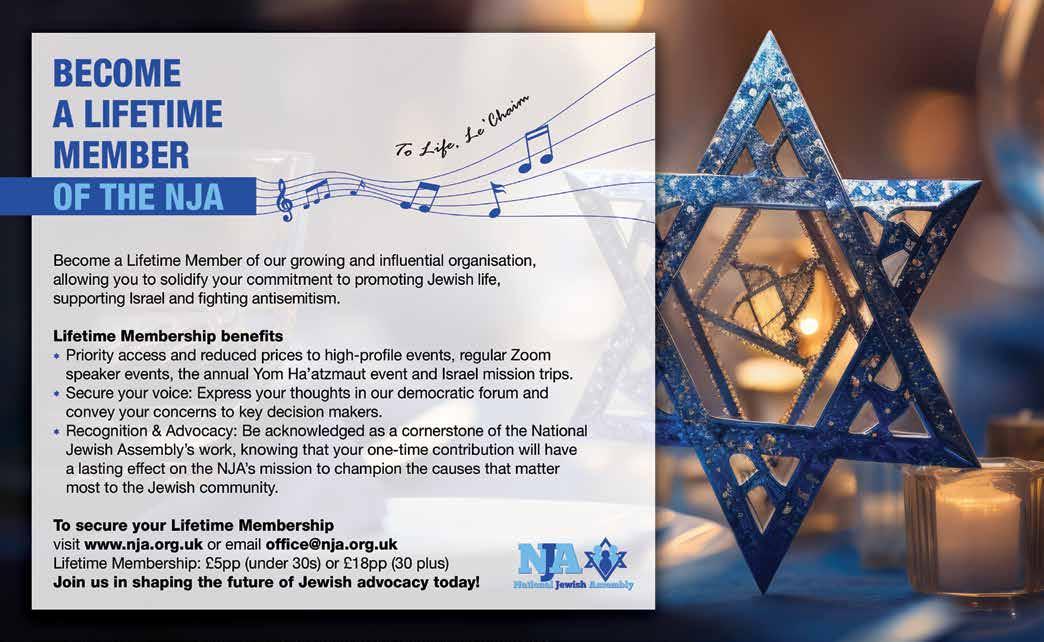




ü
ü
ü
ü
ü
ü
ü

The name of the Parshah, “Shelach,” means “Send” and it is found in Num bers 13:2.
Moses sends twelve spies to the land of Canaan. Forty days later they return, carrying a huge cluster of grapes, a pomegranate and a fig, to report on a lush and bountiful land. But ten of the spies warn that the inhabit ants of the land are giants and warriors “more powerful than we”; only Caleb and Joshua insist that the land can be conquered, as G‑d has commanded.
The people weep that they’d rather
return to Egypt. G‑d decrees that Isra el’s entry into the land shall be delayed forty years, during which time that entire generation will die out in the de sert. A group of remorseful Jews storm the mountain on the border of the land, and are routed by the Amalekites and Canaanites.
The laws of the nesachim (meal, wine and oil offerings) are given, as well as the mitzvah to consecrate a portion of the dough (challah) to G‑d when mak ing bread. A man violates the Shabbat by gathering sticks, and is put to death. G‑d instructs to place fringes (tzitzit)

on the four corners of our garments, so that we should remember to fulfill the mitzvot (divine commandments).

During Shabbat dinner, little Sarah whispered to her mom: “Is it a mitzvah to listen to the rabbi?” Her mom smiled and said, “Of course!” Sarah paused and said, “Then Abba is doing SO many mitzvot—he listens with his eyes closed!”

Using all the shapes, can you make the shape on the right?
1- Fringes worn on the corners of a four-cornered garment, called _______, remind us of the mitzvot we have to do
2- The number of spies Moses sent to the Land of Canaa n
3- The name of this week’s Parshah (Torah portion)
4- Today, when we bake bread, we burn a small piece of the dough, just like in the times of the Mishkan they gave a portion to G-d; this is the mitzvah of ______
5- Out of all the spies, only _______ and Caleb had good things to say about the land
6- Because they did not want to go into the Land of Israel, the Jews would now have to roam in the desert for _______ years
7- The Jews were told that Israel is a land “flowing with milk and _______”

A boy came home from shul looking very serious.
His mother asked: “How was the rabbi’s speech today?”
He said: “It was like the creation of the world.”
She smiled proudly: “Wow! That powerful?”
He answered: “No… it started in darkness, took forever, and by the end, I needed a rest too!”
I have no voice, yet I’m read out loud, Sometimes alone, sometimes to a crowd.
I tell old stories, laws, and song—
With me, your Jewish roots are strong. What am I?
Answer: The Torah




















